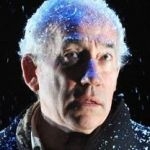Hi Sheffey,
Honestly, I don't know why Drs. Park and Li said the benefits of tongue ablation were short-lived. I kinda wonder myself. They don't say why the benefits are short-lived in the interview. I thought that getting an MMA, the most drastic sleep apnea surgery available, would definitely open my throat area enough that if my tongue fell back, there would still be enough room to breathe. The doctor said that indeed there would be an immediate benefit for me, but that since my situation would "progressively get worse," the benefits would be short-lived. I was shocked, and didn't know what to say or ask at the time. I just left the office and sat outside the foyer on a park bench for a long time in stunned silence while the Silicon Valley businessmen in their slick suits paraded past me. Once I regained my momentum, I got up and started thinking of Plan B. I'm glad I don't have to "feel" for you. Obviously you're braving the "crap" better than me--I take strength from that. I'm getting the feeling the doctors know something we don't? I don't know. I wish I would've asked more questions.
Radiofrequency Ablation of the Tongue Base
Re: Radiofrequency Ablation of the Tongue Base
_________________
| Machine: PR System One REMStar 60 Series Auto CPAP Machine |
| Additional Comments: Use F&P Simplus FFM as a backup |
+ Original Deluxe-Style Chinstrap + Nexcare Low Trauma tape
Re: Radiofrequency Ablation of the Tongue Base
It is truly unfortunate that the information shared on various treatments, even by noted experts, are typically biased. I have read many of Dr. Parks comments and have heard Dr. Li lecture. Dr. Li is a big advocate of MMA because in his hands, this demonstrates the best results. But MMA is a very invasive procedure and it should be reserved for a very specific subset of patients. I completely disagree with the comments of the results being short lived. OF the patients who have been relieved of their need for CPAP, only 15% have relapsed after 5 years. Ablation of the tongue base in the office setting. Most performed this in the operating room as part of a combined procedure. I have been performing this since 2009 and have performed over 6,000 individual procedures. It is a great procedure but will not cure everyone. Success is a word I do not use. My goal is to achieve a state where the patient is no longer at risk from the chronic intermittent hypoxia (CIH)low oxygen levels that occur throughout the night. It is this CIH that is the culprit in the associated co-morbidities like Diabetes, Hypertension, Heart Failure, Heart Attacks, Strokes, Atrial Fibrillation, Kidney Disease, Dementia, etc... I try to achieve three goals with therapy. The first is to normalize the patients nighttime oxygen level. The second is to have the patient feel more rested and eliminate or improve their excessive daytime sleepiness. The third is to eliminate or improve their snoring. A comment on AHI. The absolute number is less important that the effects. I have seen AHI's less than 15 with severe desaturations and AHI's greater than 30 with minimal desaturations. I do not treat numbers. I treat the patient. Of course, the oxygen saturation and nadir numbers do need to be treated. I have two categories of Cure. The first is an "Absolute Cure by the numbers, AHI <5, O2% Nadir >89%, and TST <90% less than 5% or 9 minutes (These two number vary greatly in the literature), and Epworth <10. The second is the "CPAP Cure", this achieves the same results as the first but the AHI is >5. Radiofrequency is an excellent first line treatment option for people who choose an attempt at cure over a life-long therapy of CPAP or an Oral Appliance. There is a learning curve but it is extremely safe with no long term complications such as swallowing difficulties, taste disturbances or speech changes. Remember, any procedure done incorrectly can cause severe injury. Radiofrequency can cause these injuries if not done properly. It has taken me 5 years of research and fine tuning to achieve the results that my patients experience. In my hands, approximately 30% of severe sleep apnea patients, 45-50% of moderate sleep apnea patients and up to 70% of mild sleep apnea patients have been cured of the need for CPAP or OAT. The biggest problem I have experienced is not being able to determine which patient in each category will achieve the "No CPAP" status. The good news is that with minimal risk, minimal to no downtime and no long term complications, the only thing a patient really has to lose is their CPAP. Sleep apnea can be a multi-level disease and therefore will always require multiple treatment options. A side note is that a meta-analysis of studies demonstrated that up to 40% of sleep apnea patients never are able to use CPAP for a variety of justifiable reasons. Of the 60% who do use CPAP, the average usage in America per night is only 5 hours. 5 hours a night is only 62.5% of an eight our night. If only 60% of patients achieve this, then if we look at 100 patients starting CPAP, 40 will never be able to use it and 60 will use it 62.5% of the time. Actual overall success of CPAP in these 100 patients is only 37.5%. This a cold hard fact concerning CPAP success in America.
Re: Radiofrequency Ablation of the Tongue Base
Thank you for this post Dr. J Silveria.Ablation of the tongue base in the office setting. Most performed this in the operating room as part of a combined procedure. I have been performing this since 2009 and have performed over 6,000 individual procedures.
My prescription is for BiPAP pressure 18/24 which is quite a high pressure, as I am sure you know, to tolerate.
I have discussed with a top notch ENT tongue-base surgical reduction with the goal, not of eliminating the need for CPAP, but instead to reduce the required pressure. This doctor is a top-notch surgeon and is, by his own admission, biased against ablation.
Some questions for you. One, is lowering of required pressure in severe cases a likely outcome of tongue base ablation?
Two, do you perform ablation in the office setting or the operating room?
Three, do you do tongue base ablation in one visit or multiple visits?
(There is a new practice in town (Savannah) that has advertised four to six ablation treatments for tongue base reduction. I would have no problem traveling to Douglas for multiple treatments.)
Thank you for consideration.
Sheffey









